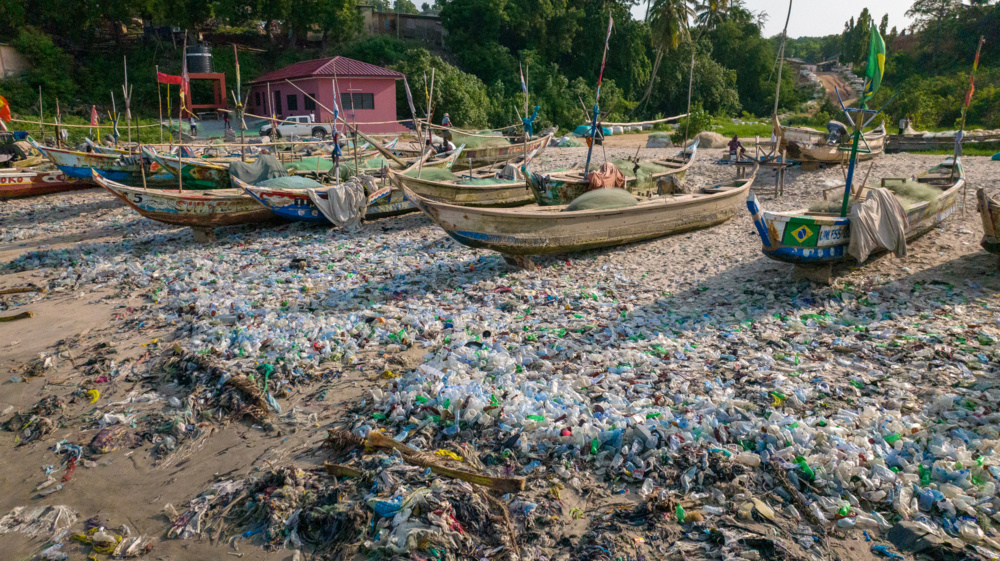
Decision to extend Global Plastics Treaty negotiations is better than compromise to address crisis, says Environmental Justice Foundation
This weekend, the fifth and theoretically final session of talks on a legally-binding and universal plastics treaty (INC-5) ended in Busan, South Korea with a decision to hold more talks. The decision to extend negotiations to an INC-5.2 is not ideal, but necessary, says the Environmental Justice Foundation (EJF), as it avoids a premature compromise that would have failed to address the scope and scale of the plastic crisis.
Plastics have infiltrated every part of the environment and human life cycle. Scientists have found plastics within our bodies – our blood, organs, breast milk – and even in foetuses before they’re born. The problem has only grown, says EJF, as every piece of plastic that has ever been produced still exists in our environment today.
It generates a large and rising amount of carbon emissions, and much of the plastic we produce ends up in our ocean, choking marine ecosystems and the lives of coastal communities who rely on them. The plastics crisis is one of the most pressing issues of our time, and while the lack of urgency is concerning, says EJF, the current weak state of the treaty necessitated these extended negotiations.
The obstructionist tactics of petrochemical interests and like-minded states, and a lack of inclusivity, have muddied the treaty process, according to the NGO. Over the week of talks, fossil fuel and petrochemical interests worked to limit the treaty through efforts to omit production reduction and chemicals, despite calls from over 100 countries for measures to limit plastic production.
Seat limits in the negotiation rooms also excluded observers from critical discussions, including the Indigenous peoples’ caucus and waste pickers. During the final three days, observers were entirely locked out of the contact group meetings. Ahead of INC-5.2, it is imperative to establish mechanisms that prevent further stalling and exclusion, says EJF.
The proposed negotiating framework for INC-5.2, while welcome, also has shortcomings, says EJF. Key gaps highlighted by the NGO include a failure to tackle the full lifecycle of plastics, the absence of an article on hazardous chemicals of concern, inadequate language around the development of non-toxic reuse, refill and repair systems, and a weak lifecycle approach to addressing fishing and aquaculture gear.
EJF urges delegates at INC-5.2 to safeguard human and environmental health with a comprehensive agreement on these critical provisions, and calls for a more inclusive and transparent process to achieve this.
Steve Trent, EJF CEO and Founder said, “We are in the midst of a massive public health crisis. All our human rights rely on a healthy environment, yet we've turned our natural world and our bodies into an ever-growing garbage pile. This extension of INC-5 is important for achieving a strong treaty, but this delay is a reminder that a few ‘like-minded’ countries have prioritised the fossil fuel and petrochemical industries over a safe, sustainable future. This is a betrayal of every single person on this planet who is choking under the sheer weight of plastic pollution.”
“We cannot afford an ineffective and unambitious treaty. It’s time to move away from the wasteful culture of unnecessary single-use plastics, and towards one where we curb the need for plastic production, remove polluting and toxic chemicals from our environment and our bodies, and respect people who have long been marginalised by plastic pollution.”
Salisa Traipipitsiriwat, EJF Senior Campaigner and observer at INC-5 said, “While the extension to INC-5.2 is welcome, it is crucial that we don’t repeat the shortcomings of INC-5. At INC-5, transparency and ambition were put to the test. The talks did not fail because plastic pollution is unsolvable, we did not reach our goal because those with solutions were excluded from the room.”
“We need transparent and inclusive negotiations, we must resolve the problematic text that could obstruct meaningful solutions, and most importantly, we need a voting mechanism to move forward when consensus cannot be reached.”
ENDS
Notes to editors
The official title of the proposed negotiating document for the INC-5.2 negotiations is the Chair’s non-paper.
EJF works internationally to inform policy and drive systemic, durable reforms to protect our environment and defend human rights. We investigate and expose abuses and support environmental defenders, Indigenous peoples, communities, and independent journalists on the frontlines of environmental injustice. Our campaigns aim to secure peaceful, equitable, and sustainable futures.
Our investigators, researchers, filmmakers, and campaigners work with grassroots partners and environmental defenders across the globe. Our work to secure environmental justice aims to protect our global climate, ocean, forests, wetlands, wildlife and defend the fundamental human right to a secure natural environment, recognising that all other rights are contingent on this.
For more information, please email media@ejfoundation.org.
SIGN UP FOR OUR EMAILS AND STAY UP TO DATE WITH EJF

